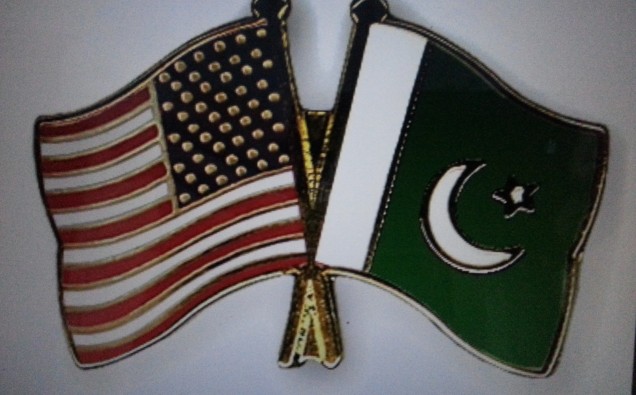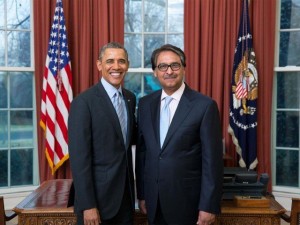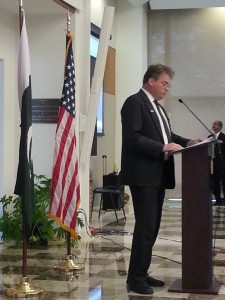
Pakistani-Americans got an insight into unprecedented military operations in tribal regions along the border with Afghanistan, which has eliminated 3,400 terrorists and, according to analysts, also dealt a crippling blow to the groups such as the Haqqani network.
The Pakistan army has also lost 218 officers and soldiers in the operation, known as Zarb-e-Azb, launched in North Waziristan 2013, which involved 1,93,000 soldiers, the largest military deployment in the history.
The opportunity came in the form of second Convention of Pakistani-American Community that Islamabad’s Ambassador to the U.S. Jalil Abbas Jilani hosted on Saturday. The interaction seeks to apprise the community of Pakistan’s achievements in the key economic and security areas. The meeting drew a gathering of community leaders, entrepreneurs, political activists and members of the civil society.
In a sign of fast-improving relations – from a period of fluctuations during the height of Afghan war and controversies over drone and cross-border militancy on Pakistan’s western border, the two countries are now moving apace to expand ties. A Pakistani fertilizer company is investing over one billion dollars in the United States.
Ambassador Jilani remarked that the U.S.-Pakistan relationship is now on firm and stable trajectory, particular cooperation in the energy sector, in counter-terrorism efforts and the high volume of two-way trade that helps both nations.
For many attendees, it was the first time to directly hear from senior government and military officials about the ongoing military and law enforcement operations in the tribal areas and other parts of the country, including Karachi, Pakistan’s financial capital.
The participants were amazed to know the amount of explosives recovered during the ongoing operation, enough to launch 15 Improvised Explosive Devices (IED) attacks in a single day for 15 years at a stretch. IEDs are considered by the Obama administration as a shared threat to Pakistan, Afghanistan and the region. Washington has been helping Pakistan with technical expertise and equipment to detect and defuse these devices – a fact profusely acknowledged by Ambassador Jilani and Defense Attache Brigadier Chaudhry Sarfraz Ali.
North Waziristan had become a hotbed of extremists from all over the world, Ambassador Jilani said of the challenge. The operation has been a “huge success” and almost 95 percent of the area infested with militants had been cleared, he said.
The operation has severely damaged groups such as TTP which challenged the Pakistani state and killed thousands of civilians in retaliatory bombings, before Pakistan moved into its stronghold of North Waziristan. Then there were, IMU (Islamic Movement of Uzbekistan, ETIM (East Turkistan Islamic Movement) and the Haqqani network, considered the most serious threat to U.S. forces in Afghanistan. The participants of the convention were, however, told that nearly 80 percent of the Haqqani network is based in Afghanistan.
During a presentation, the participants were shown the images of Taliban brutality and the cache of assault rifles seized, enough to equip equivalent to one brigade force.
As many as 22,000 terrorists have been killed by Pakistani troops and law-enforcement agencies fighting al-Qaeda-linked militants who killed 64,000 people in attacks across the country in nearly a decade.
Ambassador Jilani noted the U.S. support to Pakistan in fighting terrorism and increasing its counter-terrorism capabilities through provision of arms and ammunition – latest version of F-16 combat fighter and precision-guided missiles – which are able to perform same task as the U.S. drones would have performed.
Pakistan has received about $15 billion in assistance from the United States to combat terrorism, of which over $10 billion in Coalition Support Fund and the rest in the shape of military assistance, grants for the economy and budgetary support.
The war on terror has inflicted losses of over $100 billion on Pakistan’s economy.
Improved security situation, however, has helped the government stem the downslide in economy and put it back on an upward path. Pakistan’s economy posted a 4.24 percent growth in the financial year that ended June 30 and the government is expecting 5 percent GDP growth in the current financial year.
On the question of energy shortages, Ambassador Jilani said 3,000 megawatts have been added to the national grid in two years – about 1200-1400 mw courtesy the United States –, and 8,000 mw to be added by 2017.
Frequent power outages have hampered Pakistan’s economy over the year with shortages as high as 6,000 mw during peak summer. Prime Minister Nawaz Sharif’s government has drawn a roadmap that would add 21,000 mw in short, medium and long term.
This would encourage foreign investment in Pakistan, South Asia’s second-biggest economy which offers best returns on investment in the region.
Nearly 800 multinational companies are currently operating in Pakistan , including 67 U.S. companies with big names such as Microsoft, IBM, Intel, Colgate Palmolive, Hardees, McDonalds, KFC, Pizza Hut, Dunkin Donuts, Levisl, Pepsi and Coca Cola.
The participants were delighted to hear the news about the renewal of U.S. Generalized System of Preference (GSP) for Pakistan, effective June 29, which was lapsed in 2013. This would facilitate duty-free entry of many goods into U.S. market. U.S.-Pakistan two-way trade is over $5 billion, with the balance of trade in favor of Pakistan.
Pakistan is expected to press for more country-specific trade concessions during the upcoming visit by Prime Minister Nawaz Sharif at the invitation of President Obama. Sharif is scheduled to meet President Barack Obama for talks in the third week of October on security and economic cooperation. Sharif will begin hi visit by attending a major business conference in Chicago.
Michael J Delaney, Assistant U.S. Trade Representative for South Asia, and Jonathan Carpenter, Deputy Special Representative for Afghanistan and Pakistan also made presentations, highlighting the tremendous scope for expansion in trade and economic areas.
















